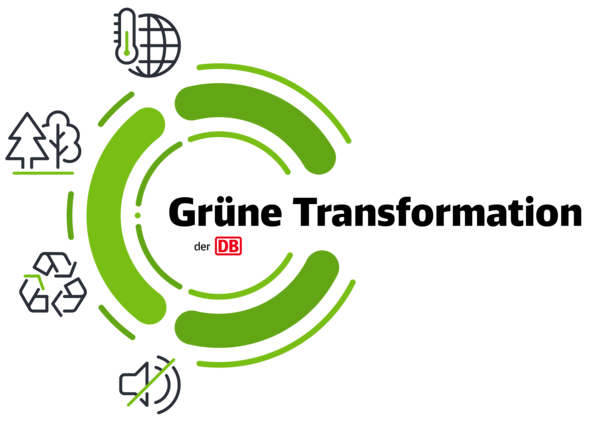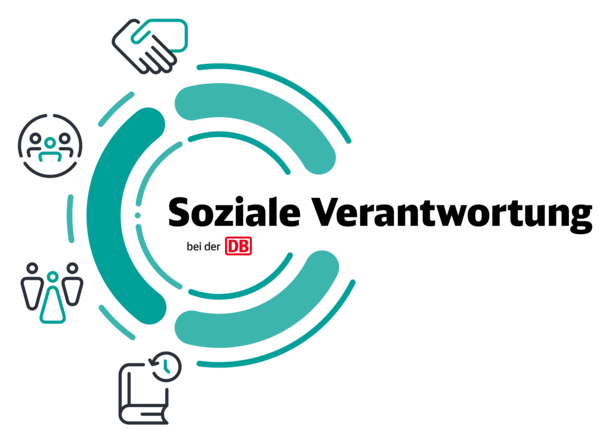Deutsche Bahn's green transformation
As one of Europe's largest transport infrastructure operators, we take responsibility and strengthen the railways in Germany - for the climate, for people, for the economy and for Europe.
We have anchored this understanding in our Group strategy Strong Rail and are implementing it with the green transformation. Because we know: The German and European climate protection targets can only be achieved through a massive shift in traffic to environmentally friendly rail. And DB has a key role to play here.
With the green transformation, we are living up to our ecological responsibility: we are making our products, services and operating processes sustainable. The green transformation is a process that we approach holistically across the four fields of environmental action: Climate protection, nature conservation, resource protection, and noise protection. In so doing, we are also facing up to our social responsibility, which concerns the entire Group.
We have committed to an ambitious climate protection target: Being climate neutral by 2040. Our climate protection target is a net-zero target based on the standard of the Science Based Targets initiative (SBTi) with the 1.5 degree compliant reduction pathway. This means at least a 90% reduction in Scope 1 to 3 emissions compared to 2019. We want to neutralize the residual emissions of a maximum of 10 % that are difficult or otherwise unavoidable.
In order to achieve this target, we are relying on four powerful levers: increasing the share of renewable energies, phasing out diesel, implementing the heat transition, and increasing energy efficiency.
Since the beginning of 2025, all stations, maintenance depots, office buildings and facilities in Germany that are serviced by DB Energy have been supplied with 100% renewable energies. This also includes, for example, interlockings, switch heaters and trackside lighting. By 2038, we will convert DB's traction current in Germany completely to renewable energies.
Already today, more than 90% of all rail transport services in Germany are provided electrically (based on weight-related ton kilometers). We want to further increase this share together with the Federal Government. At the same time, we are focusing on a technology-open approach with alternative drives and fuels to replace fossil diesel.
On the way to climate neutrality, DB Group also wants to stop using fossil fuels for heating. We are working on various concepts and measures to achieve this. At the same time, we are utilizing the energy we use as efficiently as possible.
The protection of nature and biodiversity is a central task for us, which we take into account from the planning to the construction and operation of our facilities. To that end, we are developing a biodiversity strategy that extends beyond compensating for negative impacts and creates sustainable added value for nature.
To counteract the loss of biodiversity and ecosystems, we act according to the principle of the mitigation hierarchy: firstly, negative impacts on nature must be avoided as far as possible. Where intervention is unavoidable, we implement measures to mitigate the negative effects. We create suitable compensation areas for any remaining adverse effects in order to fully compensate for them in accordance with nature conservation regulations.
We document all data on our compensation obligations in the Web-based nature conservation and compensation information system (FINK). This enables us to record the current status of our compensation obligations on an ongoing basis and thus fulfill our reporting obligations to the EBA in accordance with the Federal Nature Conservation Act. In 2024, 932 projects and 6,948 compensation measures (3,256 thereof being for species protection) were newly added to the system, which are to be implemented in the coming years. From 2014 to the end of 2024, we added 10,130 projects – with a total of 67,035 compensation measures – to the system. These include 25,590 measures for species protection.
We aim to establish a circular economy by 2040, with a particular focus on Germany. For us, a circular economy means using raw materials sparingly, keeping them in the value chain for as long as possible and - where technically and legally possible - recycling our waste in order to reduce the need for primary raw materials and the amount of waste generated.
For example, we will significantly increase the content of our three main resources - rail steel, track ballast and concrete ties - that are recycled in the coming years. We have set ourselves binding targets for this by 2030. This is because we need large quantities of these three resources in particular for the maintenance and expansion of our infrastructure. Another lever is the way in which we handle materials that have already been used. We will continue to maintain our high recycling rate of at least 95% in the future.
Moving forward, we will pay even more attention to the careful use of resources when purchasing new vehicles. For example, we will only purchase vehicles that have been manufactured in a resource-saving manner and where efforts have been made to use recycled, recyclable and renewable resources.
We keep our existing fleet fit through redesign and technological overhauls. Among other things, 3D printing helps us to do this, which we use to produce replacement and non-deliverable parts for train operations.
We continue to work with the Federal Government to implement our noise reduction target. By 2030, we want to relieve more than 800,000 affected residents from rail transport noise. That is more than half of all residents who currently live near affected routes.
By 2050, we want to have reduced rail transport noise for all affected residents.
To achieve our goals, we are relying on our two-pillar strategy: implementing measures on the infrastructure as well as on the vehicles.
With noise reduction measures on the infrastructure, we are providing residents with lasting and noticeable relief from rail transport noise. Specifically, by means of local noise remediation measures, such as noise barriers along the track (active measures), equipping apartments with soundproof windows or noise-proof ventilators (passive measures), we reduce noise pollution for local residents.
DB Cargo's freight wagons in Germany have been fully converted to quiet brakes since 2020. We achieved our goal of having DB Cargo's electric mainline locomotives in Germany with quiet braking systems by 2025 ahead of schedule in 2024. We are also pursuing further measures:
- By 2030, we want to phase out the older DB Cargo series 232 and 233 diesel locomotives with noisy gray cast iron block brakes. Only locomotives of the class 77 series with less than 2 % of DB Cargo's route performance (in weight-related ton kilometers) will then still be running with these brake systems.
- DB Long-Distance plans to replace all diesel-powered shunting locomotives with quieter and more climate-friendly hybrid shunting locomotives. In this way, noise reduction also contributes to climate protection. Delivery of the hybrid shunting locomotives is expected to take until 2028 due to supply bottlenecks.
With around 236,000 employees in Germany alone (DB Group including DB Schenker), millions of customers and numerous business partners, the DB Group occupies a central position in society. In addition to ecological and economic aspects, our commitment to social issues is also an integral part of our holistic approach to sustainability. Our social commitment is characterized by four standpoints that provide guidance for us and our stakeholders. They correspond to our fundamental convictions and our social value compass at DB Group:
Strengthening community
Supporting social engagement
Promoting diversity
Responsibility for our history
Behind our four standpoints are various focal points with numerous activities and initiatives. They reflect the details and everyday impact of our community involvement.


